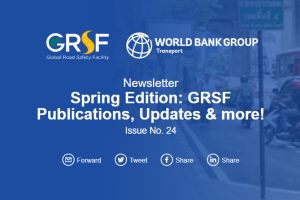First Guide to Help Identify What Works and What Does Not Work in Road Safety
March 15, 2021

Washington D.C. (March 15, 2021) – The World Bank’s Global Road Safety Facility (GRSF) launched today the Guide for Road Safety Interventions: Evidence of What Works and What Does Not Work. The guide will help road safety practitioners understand that what sometimes appear to be “common-sense” approaches often not deliver the best road safety outcomes. Although some interventions provide benefits, others have very limited or even negative impacts, despite being commonly—and mistakenly—recommended and adopted.
Road crashes result in an estimated 1.35 million deaths and 50 million injuries worldwide per year, with 93 percent of these occurring in Low-Middle Income Countries (LMICs). The scale of the current response to this continuing crisis does not match the size of the problem. In addition, limited road safety resources are often expended on ineffective interventions. The guide aims to address this. While road safety knowledge has improved over recent decades, there is still a need to enhance decision making when selecting and applying effective evidence-based road safety interventions.
The guide launched today responds to the critical need for effective evidence-based solutions. It offers a range of recommendations with a focus on interventions in LMICs, although the information may also be of relevance to all countries. The contents will be valuable to those working on road safety at policy or practitioner levels, including international development organization technical teams and others who seek to establish, expand, or improve road safety programs in LMICs.
The guide sets knowledge on evidence-based interventions within a “Safe System” context, providing advice on each of the Safe System pillars (road safety management, safe roads, safe speeds, safe vehicles, safe road users, and post-crash care) while recognizing that evidence-based solutions must be drawn from across pillars to produce effective road safety outcomes.
Equally important, the report also identifies clear examples where interventions are not effective. These include increasing travel speed without improving quality of safety infrastructure, and most forms of post-license driver and rider education and training, which can increase the level of confidence and lead to risk-taking.
The report also guides action: There are effective alternative interventions described in the report to encourage decision-makers to consider and adopt the most effective options.
Dr. Soames Job, Head of the GRSF, said: “Funding to deliver road safety outcomes is limited in all countries. Therefore, there is a need to invest in evidence-based solutions that will provide the greatest benefit as quickly and efficiently as possible. In this guide, GRSF has synthesized the substantial but often not readily available body of scientific evidence that exists on what works and what does not. The aim is to encourage and facilitate the adoption of interventions based on rigorous evidence, not a common-sense approach which can be surprisingly misleading in road safety.”

With this research, GRSF also wants to emphasize the need to continue building the knowledge base on effective road safety interventions, particularly in LMICs where there are a number of gaps in knowledge.
The guide was developed by GRSF with funding support from UK Aid and the World Bank. To view and download the report, please visit: roadsafetyfacility.org/whatworks.
_____________
ABOUT GRSF ⌵︎
The Global Road Safety Facility (GRSF), hosted by the World Bank, provides funding, knowledge, and technical assistance to build and scale-up the knowledge, technological, managerial and delivery capacities for road safety of low- and middle-income countries. GRSF has received total donor pledges of $74 million, in addition to support from the World Bank in its hosting capacity. GRSF’s road safety work has expanded to 81 countries, improving road safety outcomes through technical assistance, training and capacity building, as well as grant-funded activities. GRSF has received numerous prestigious international awards and recognitions for its work, including, most recently, three 2020 Prince Michael Awards for its effective delivery of global road safety.
Contact ⌵︎
GRSF Media Relations: Giannina Raffo – @email
@WBG_Transport #GRSF #WhatWorks


